 |
| Cherry blossoms, Tendo City, Japan |
 |
| Apple blossoms, northern Colorado |
In Tokyo, the cherry blossom season was ending. I did get a glimpse of how it must have looked a few days earlier.
The flowering cherries, sakura if you look online in English, zakura as the Japanese name in plant identification books, have been cherished and grown by the Japanese for more than a thousand years. The main native species are Prunus x yedoensis, P. jamasakara, P. serrulata, and P. pendula, but there are hundreds, probably thousands, of hybrids and named varieties. The colors range from white through deep pink, single and double.
In addition, related plants from around the world, such as American plums, Prunus americana, peaches Prunus persica, and apples, Malus domesticus, flower about the same time across Japan. All are rose family, Rosaceae, and most in the same genus, Prunus despite different common names, which is why the flowers are often so similar. I decided to be lazy and simply enjoy the splendor of the flowers, not identify the trees. If you are buying a flowering cherry, since there is so much diversity, look critically at the description of the particular plant, not just the species.
From Tokyo, the tour I was on, a garden tour organized by Pacific Horticulture Society (link), went north and then east. First, north to Nikko and Lake Chuzenji.
I had wanted to see the mountains of Japan and ooh! impressive!
It wasn't a mountain-viewing tour, but look:
 |
| Lake Chuzenji |
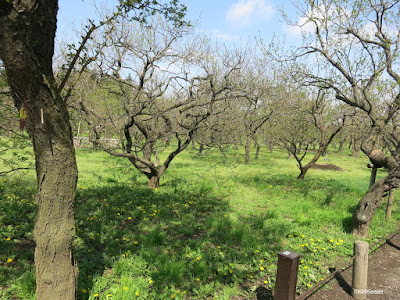 |
| Japanese apricot (plum) orchard, for flowers not fruit |
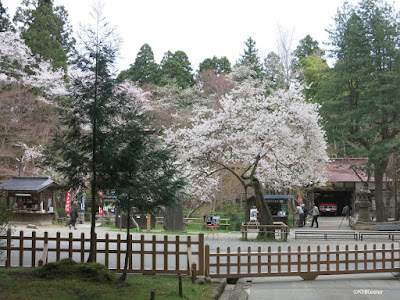 |
| Sakura at Hiraizumi |
but clouds of white and pink were wonderful too.
More mountains, these seen from the Yamadera Temple, Yamagata Prefecture.
In Tendo City, we arrived on a weekend to find the cherry blossoms at their peak. On Sunday, in lovely spring weather, lots of people came out to enjoy sakura-viewing and a local festival, letting me capture these photos:
The row of trees below will look like the mume photo in a week. Planting big stands of trees that have just a brief period of glory is common in Japan. Beyond the beauty, there's a philosophical statement: cherish the moment! Flowering is fleeting, life is fleeting: savor it.
 |
| Sakura in full bloom, Tendo City. |
And, classically, a young couple picnic under the flowering sakura.
How absolutely stunning, northern Japan in spring!
Comments and corrections welcome.
References
Levy-Yamamori, R. and G. Taaffe. 2004. Garden plants of Japan. Timber Press, Portland, Oregon.
Richards, B. W. and A. Kaneko. 1989. Japanese plants. Know them and use them. Shufunotomo Co. Ltd. Tokyo, Japan.
van Wyk, B-E. 2005. Food plants of the world. Timber Press, Portland, Oregon.
Kathy Keeler, A Wandering Botanist
More at awanderingbotanist.com

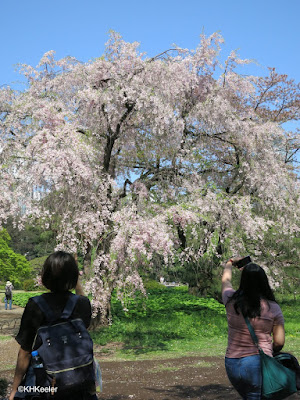


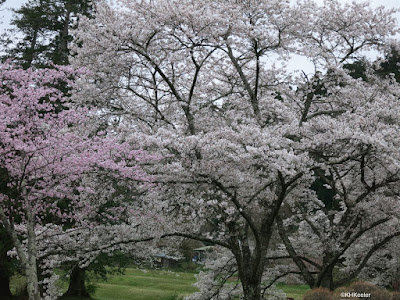

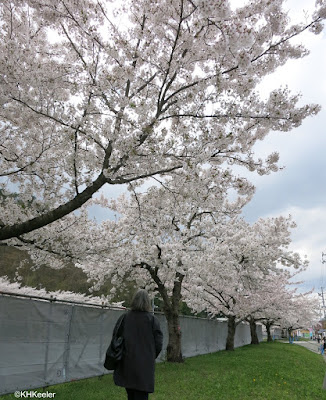

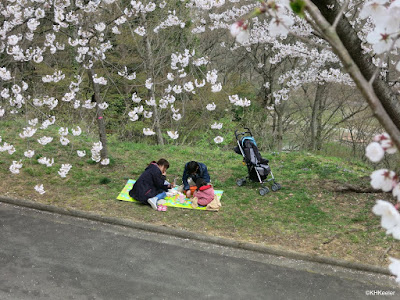


Tokyo is a place full of flowers that grabs the attention of botanists. So they should visit this place for their research. Sounds great informational blog.
ReplyDeleteIn this time, I also going to visit Tokyo and see the beauty. I am very excited and hapopy I will go there. So I am damn sure this is the great exprience for me, and also during this tour, I must see the Salt Lake City to yosemite.
ReplyDeleteMy friends searching the informaiton aobut cherry blossom so i think this is the best and I must share with them. Anyway, at the time, i am busy in my cherry blossoms in washington dc, and during this tour, I click the images and enjoyed a lot there.
ReplyDeleteI read your blog. It is very useful for me.
ReplyDeleteVisit Our: cherry blossom tours japan